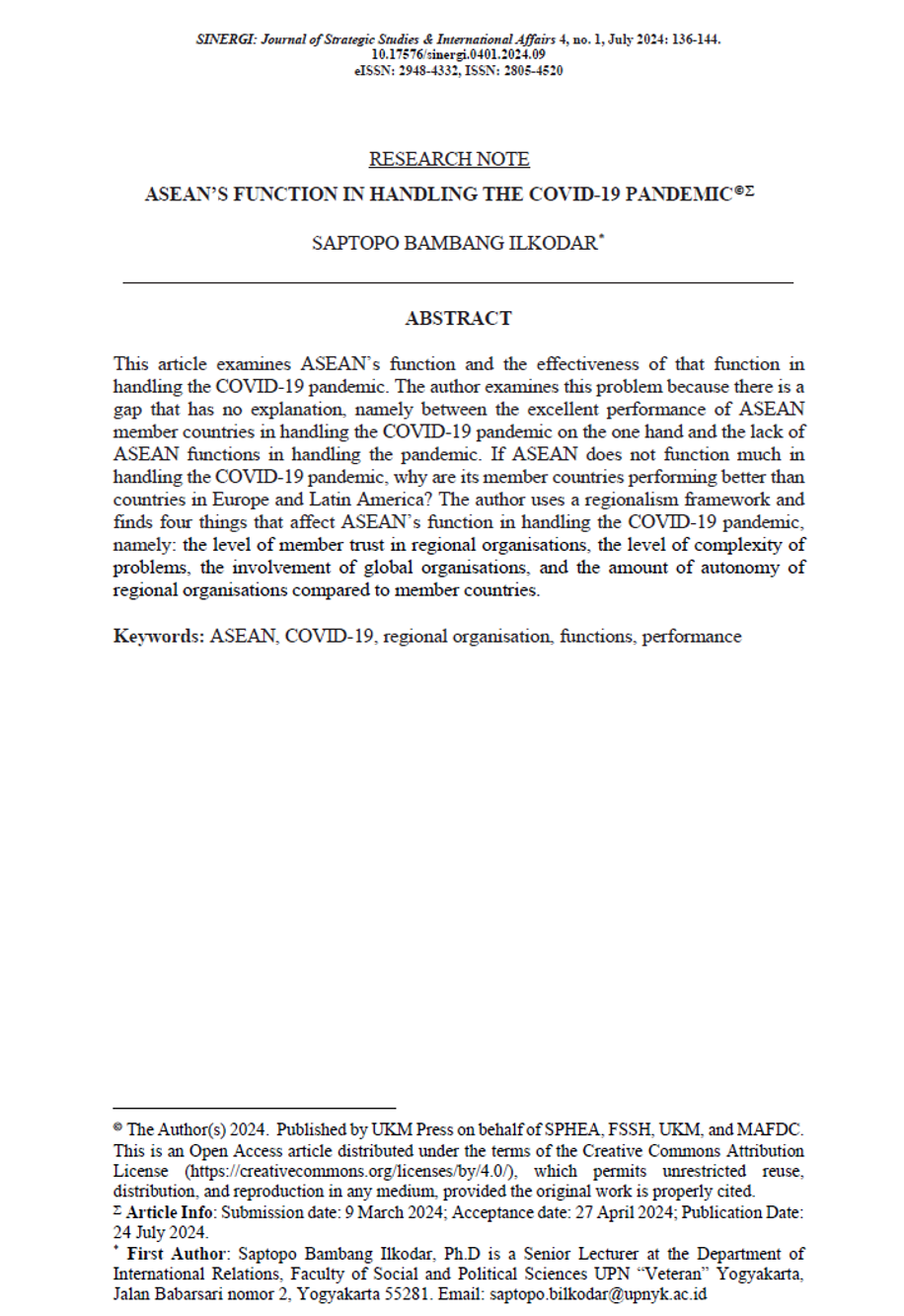ASEAN’s Function in Handling the COVID-19 Pandemic
Main Article Content
Abstract
This article examines ASEAN’s function and the effectiveness of that function in handling the COVID-19 pandemic. The author examines this problem because there is a gap that has no explanation, namely between the excellent performance of ASEAN member countries in handling the COVID-19 pandemic on the one hand and the lack of ASEAN functions in handling the pandemic. If ASEAN does not function much in handling the COVID-19 pandemic, why are its member countries performing better than countries in Europe and Latin America? The author uses a regionalism framework and finds four things that affect ASEAN’s function in handling the COVID-19 pandemic, namely: the level of member trust in regional organisations, the level of complexity of problems, the involvement of global organisations, and the amount of autonomy of regional organisations compared to member countries.
Downloads
Article Details

This work is licensed under a Creative Commons Attribution-NonCommercial-NoDerivatives 4.0 International License.
To learn more about our Open Acess and Copyright Policy, click here
References
ASEAN Biodiaspora Virtual Center. 2023. Weekly Situation Report in the ASEAN
Region, COVID-19 and MPOX. WSR 2023-11
ASEAN Secretariat. 2019. Joint Statement 14th ASEAN Health Ministers Meeting.
Siem Reap, the Kingdom of Cambodia, 29 August 2019.
ASEAN Secretariat. 2019. ASEAN Leaders’ Declaration on ASEAN Vaccine Security
and Self-Reliance (AVSSR). Bangkok, Thailand, 2 November 2019.
ASEAN Secretariat. 2021. Regional Strategic and Action Plan for ASEAN Vaccine
Security and Self-Reliance (AVSSR) 2021-2025. Jakarta, 14 May 2021.
ASEAN Secretariat. 2022. Joint Statement 15th ASEAN Health Ministers Meeting.
Bali, Indonesia, 14 May 2022.
Hašová1, Blanka Wurst,and Pavla Varvažovská. 2021. “Globalization and COVID-
: The Role of Local and Regional Authorities In Context Of International
Relations.” SHS Web of Conferences 92.
https://doi.org/10.1051/shsconf/20219201057
Hecke, Steven Van, Harald Fuhr, Wouter Wolfs. 2021. “The Politics of Crisis
Management by Regional and International Organizations in Fighting
Against a Global Pandemic: the Member States at a Crossroads.”
International Review of Administrative Sciences 87, no.3: 672–690
Purwono, Andi. 2021. “ASEAN dalam Tantangan: Diplomasi dalam Mengatai
Pandemi Covid-19.” Interdependence Journal of International Studies 2,
no.1: 1-10
Rollet, Vincent. 2022. “ASEAN’s “Actorness” and “Effectiveness” Regarding the
COVID-19 Pandemic.” Region & Cohesion 12, no.1: 25-53
Schiff Maurice, and L. Alan Winters. 2002. Regional Cooperation, and the Role of
International Organizations and Regional Integration. World Bank Policy
Research Working Paper number 2872
Spandler, Kilian. 2016. Regional Organization in International Society:
Decolonization, Regionalization and Enlargement in Europe and Southeast
Asia. Dissertation, Tubingen University.
Stanley, Arnold & George Thomas Thevaril. 2022. “ASEAN and COVID-19
Pandemic: A Wake-up Call for Reimagining the Framework for Global
Health Cooperation.” Online Conference on Legal Cooperation,
Harmonization and Unification: An ASEAN Perspective. Melbourne Law
School, 28-29 October 2022
World Health Organization. 2023. WHO COVID-19 Dashboard.

